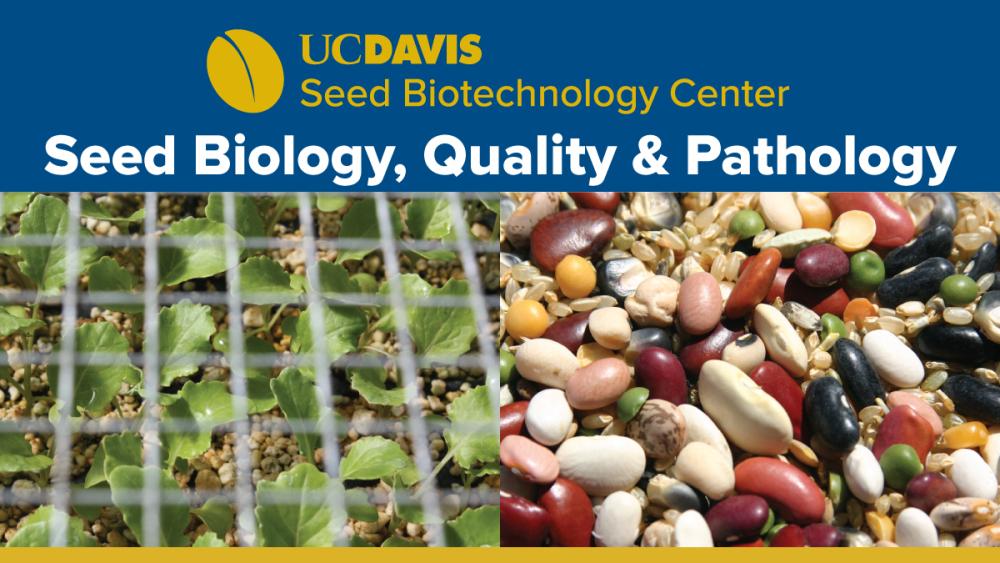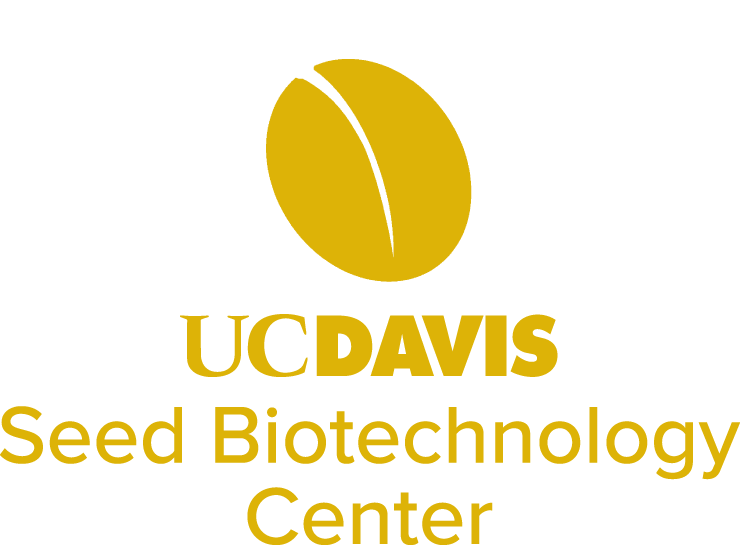
Delivering improved varieties through high-quality seeds is a vital component of modern agricultural production systems. It is critical that we understand the biological factors contributing to seed health, vigor, and viability, as well as how to measure these qualities. This course presents the scientific background and technical protocols for assessing, enhancing, and maintaining high seed quality. It also provides updates on new information, including seed pathology and enhancement. The course targets quality assurance professionals in the seed industry, new employees, consultants, breeders, and seed producers, helping them extend and update their knowledge. It's a very interactive course, with lots of hands-on exercises and demos.
September 16-18, 2026
In-Person at UC Davis
Course is 3 days of in-person instruction
Times of class coming soon
Early Registration: $1850
Regular Registration: $2150
Tuition includes all course materials and multiple breaks.
Class size is limited so early registration is recommended.
Available Discounts:
25% off - Faculty (from regular registration)
50% off - Current Grad students/Postdocs (from regular registration)
Contact us for more information about your discount.
► Course Location:
Bowley Plant Science Teaching Facility:
1200 Extension Center Drive
Davis, CA 95616
► Hotel Recommendation:
Hyatt Place - Special SBC rate coming soon
► Campus Parking information (additional parking information will be emailed to participants before the course)
COURSE CURRICULUM & INSTRUCTORS BELOW ARE SUBJECT TO CHANGE FOR THE 2026 COURSE:
Course Curriculum:
- Seed development and maturation
- Seed vigor and viability
- Seed health and phytosanitation
- Seed germination testing
- Seed pathology testing
Preliminary Lab topic areas:
- Standardized seed germination, vigor, and viability testing methods
- Seed purity testing methods
- Demonstration of new methods for seed quality and purity testing
- Standardized seed health testing methods
- Certification of labs for seed health testing
- Testing treated vs. non-treated seed (fungicide, bactericide, biological, organic & disinfectant treatments)
- Molecular vs. ‘biological’ seed health assays (indirect vs. direct assays)
- Location of infection of seeds by plant pathogens
- The sample size for seed health testing, seed sampling protocols
Instructors:
Kent J. Bradford, Professor Emeritus, Department of Plant Sciences and former Director of the Seed Biotechnology Center, University of California, Davis, CA, USA. Kent received B.S. and M.S. degrees in Biochemistry and Horticulture from Michigan State University and received his Ph.D. in Plant Physiology from UC Davis in 1981. Kent was the founding Director of the Seed Biotechnology Center, interim Director of the World Food Center, and a professor in the Department of Plant Sciences at UC Davis prior to his retirement in 2019. Dr. Bradford’s research focused on the development, maintenance, and expression of seed quality, and he continues to contribute to the outreach, education, and research activities of the Center.
Samantha Thomas has earned an MS and Ph.D. in Plant Pathology from The Ohio State University. She has been with Monsanto for 11 years and currently, she is the Stewardship and Industry Affairs lead within Quality. She works across the seed industry and regulatory partners to develop and use quality tools to address the phytosanitary risk of seed movement. Her areas of expertise include seed pathology and seed health testing, seed movement, and best management practices for vegetable seed production.
Phyllis Himmel, Director, Collaboration for Plant Pathogen Strain Identification (CPPSI). Phyllis joined the UC Davis Seed Biotechnology Center in July 2015 to lead the seed industry-funded Collaboration for the Identification of Plant-Pathogen Strains (CPPSI). She received her MS and Ph.D. in Plant Pathology from the University of Arizona. After a USDA/ARS Post Doc at the University of Illinois, she joined the Asgrow (later Seminis, then Monsanto) Vegetable Seed Company as a research plant pathologist. While at Marrone Bio Innovations, she held personnel and product management roles in the discovery and development of plant and microbe-based biopesticides.
Mike Pereira, Principal Consultant, Granum Services, LLC, has 42 years of experience in seed production, the majority of which was focused on vegetable seed production, but also more recent experience in biofuels and stevia seed production. Mike has extensive experience in leading global seed production organizations and establishing new production areas around the world. In biofuels, he established the first hybrid seed system for Miscanthus, an ethanol feedstock, and directed hybrid seed production and plantation research of Jatropha, a diesel and jet fuel feedstock. Currently, Mike consults in seeds and alternative crops through his company, Granum Services, LLC. He also is Chief Agronomist for Finistere Ventures, a leading venture capital company in agricultural technology, and is the lead instructor for three short courses for seed professionals through the Seed Biotechnology Center of UC Davis, Seed Business 101 – Horticulture, Seed Production, and Seed Biology, Quality and Pathology.
Pedro Bello has a B.S. degree in Systems Analysis and a graduate degree in Strategic Management of Information Technologies from the Pontifícia Universidade Católica de Campinas in Brazil. At UC Davis, Pedro gathered vast experience in seed research working with professor Dr. Kent Bradford for over 7 years. He is specialized in the assessment of seed quality, vigor, and storage life. He has been developing efficient tools and mathematical models for new seed technologies. His innovations in the analytical equipment for single-seed respiration measurements (Q2 Scanner) made the information from the instrument useful and more accessible to users around the world.
Riad Baalbaki, Senior Seed Botanist, Plant Pest Diagnostics Center, California Department of Food and Agriculture, Sacramento, CA, USA. Areas of specialization include seed viability and vigor determinations, as well as laboratory methods development for routine seed quality testing. His current research focuses on exploring the use of automated monitoring and data collection systems for identifying universal indicators of seed vigor, with emphasis on radicle growth measurements.”
Albre Brown, Associate Plant Pathologist, Plant Pest Diagnostics Center, California Department of Food and Agriculture, Sacramento, CA, USA. Areas of specialization include disease diagnostics, general plant pathology, integrated pest management, extension services, mycology, molecular biology, plant disease epidemiology, and phylogenetics. Current research focuses on identifying and characterizing ubiquitous plant pathogenic fungi limiting seedling germination and lifespan.
Benjamin (Beni) Kaufman is currently with Agriplex Genomics (an NGS genotyping company) where he started as the Operation Director and now is the Business Development Director. He also acts as the principal consultant at Laborector. In the past, Dr. Kaufman served as the Secretary-General of the International Seed Testing Association and as a Senior Scientist at DuPont Pioneer (now Corteva Agriscience) where in his latest role he lead the Nucleic Acid Analysis laboratory. Beni completed his Ph.D. in molecular genetics at the University of Illinois, and his M.Sc. in zoology/population genetics at Tel-Aviv University.
Matt May is a seed pathologist at Monsanto Vegetable Seeds in Woodland, CA. He has 35 years of experience in developing and conducting seed tests to detect fungal and bacterial seed transmitted and seed-borne plant pathogens.
Robert Gilbertson Distinguished Professor Robert L. Gilbertson has been a member of the faculty of the Department of Plant Pathology at UC Davis since 1990. He has established a research program in the areas of seed pathology, plant virology, and international agriculture, and has made numerous important contributions to these fields. He has received awards for his research including the Novartis Award for Outstanding Contributions to Agricultural Research, Fellow of the American Association for Advancement of Science (AAAS), Meritorious Service Award from the Bean Improvement Cooperative, The International IPM Excellence Award, the UC Davis Oscar Lorenz Award for meritorious service to the California vegetable industry and the AgSeeds Unlimted Award for dedication and outstanding service to the California processing tomato industry in 2019. Dr. Gilbertson and his colleagues have strived to integrate basic and applied research findings into sustainable integrated management of plant diseases caused by seed- and insect-transmitted pathogens. A major area of research has been the development, evaluation, and application of molecular tools to investigate seed-borne pathogens, including bacteria, fungi, and viruses. DNA fingerprinting and genomics approaches have been applied to investigate the diversity and populations of seed-borne pathogens. He teaches courses at UC Davis in Introduction to Plant Pathology, Plant Virus Vector Interactions, Plant Bacteriology, the Field Course: Diseases of Field, Fruit, Nut, and Vegetable Crops, and Feed the World, an undergraduate course. Throughout his career, he has been an active mentor of graduate students. His service activities have included being Editor-in-Chief of the international journal, Phytopathology, as well as serving as Editor for other journals.
Questions? Contact Louise Lee at lelee@ucdavis.edu.
